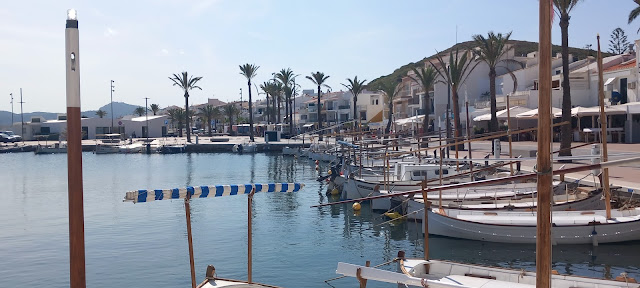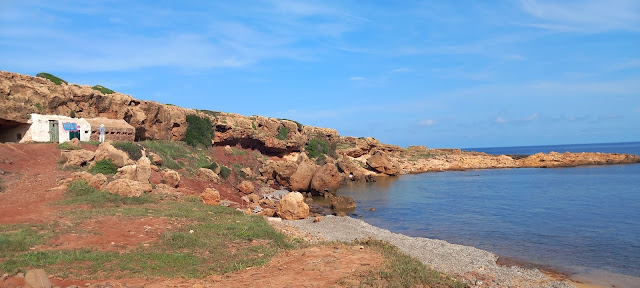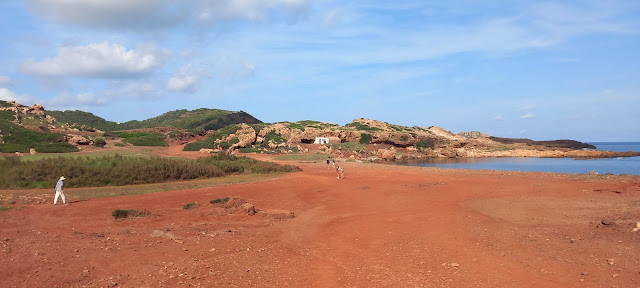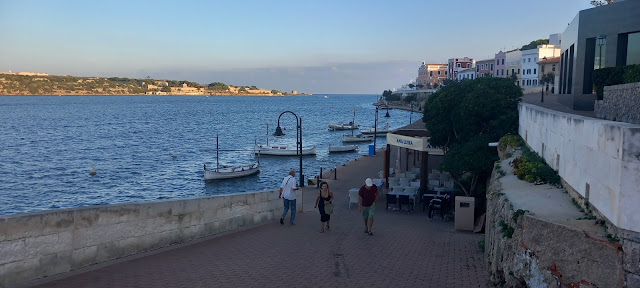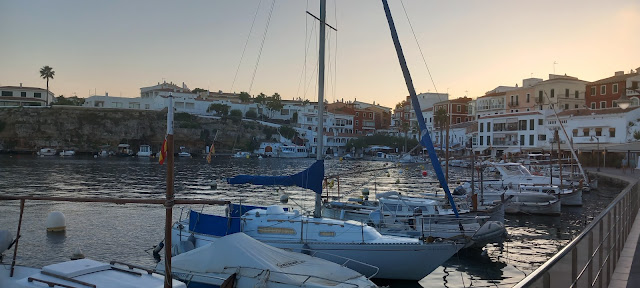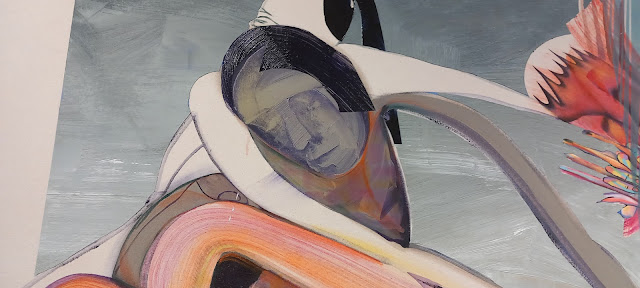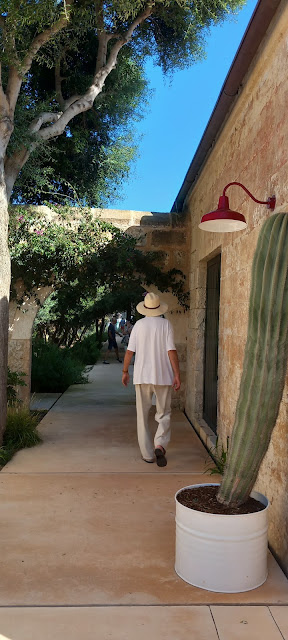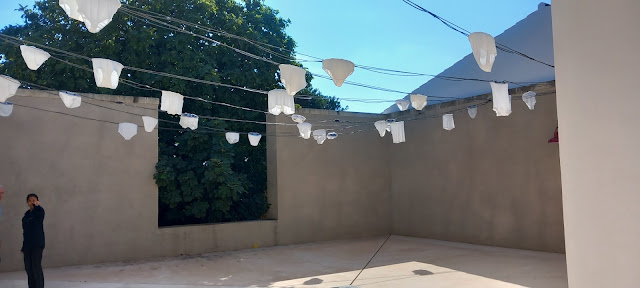Monday -October 09
Our trip started when the very convenient taxi service from Montanchez to Madrid picked us up at the finca at 06.30. We arrived at Atocha railway station at 10.00, plenty of time to catch the AVE high speed train to Barcelona at 11.25, 300k per hour, arrived at 14.00. Taxi to the port and all aboard the huge Balearia ferry to Menorca, leaving at 16.30, a fast and tranquil crossing, beautiful to see the sun setting into the vast waters of the Mediterranean.
We arrived at 20.00 in the port of Ciutadella. All very quiet, not a taxi in sight but just as we were calling the central taxi number one zoomed up, a 5 minute drive to the ancient capital of Menorca, right into the centre and a short walk to our hotel. It’s a small town with countryside and the sea all around, very laid back and peaceful. Our hotel was part of the 17th -18th century Baroque convent of Sant Augusti, El Socors, now used for various purposes including the Diocesan Museum and some minimal but perfectly adequate accommodation, the situation and marvellous terrace looking down on to the convent patio make up for lack of frills.
.jpg)
.jpg)
This actually became our favourite stay despite some more spiffy places later. After arriving and exploring the cloisters and upper floor terrace above the patio with the huge bell towers looming over, I was amazed to find that our room looked over the market plaza with the separate fish market its glass kiosk design in the centre, original buildings from late 19th century clad in green and white tiles.

 The plaza is surrounded by cafés and restaurants, ranging from quite posh to quite louche, naturally we were attracted to the louche and had an excellent dinner with range of tapas coming from a hole in the wall tapas bar with terraça right next to the fish market with local clients.....and local fish!
The plaza is surrounded by cafés and restaurants, ranging from quite posh to quite louche, naturally we were attracted to the louche and had an excellent dinner with range of tapas coming from a hole in the wall tapas bar with terraça right next to the fish market with local clients.....and local fish!
Experimented with a Pomada made from the Menorcan gin, Xoriguer, fresh lemon juice and lots of ice, very refreshing on this balmy evening and our first taste of the many British influences on the island dating from their occupation in the 18th century. Apparently the soldiers and sailors stationed on the island enthusiastically frequented the local taverns but craved gin which had so rapidly become the most popular cheap drink in England, an addiction so graphically depicted by Hogath on the streets of London. In order to satisfy this clammering new market a group of Mahon wine merchants found a solution, they imported juniper berries and distilled gin using wine alcohol from local vineyards. The Menorcans enjoyed this new spirit and gin became the national drink over the years.
We walked a little after dinner to get our bearings in the labyrinth of streets around the cathedral, then an early night after the busy day. A little worried about hubbub for sleeping but all was peaceful by midnight and the market had a slow start in the morning, it felt good to be in the middle of the living town feeling tranquil and protected behind the high walls of the monastery.
Hotel: El Claustro:https://elclaustredeciutadella.com/es/
.jpg)
.jpg)
.jpg)
.jpg)

Tuesday October 10
Off to explore the town after breakfast in a café a few steps from hotel, under the trees of Plaça d'Artrutx , they suggested we buy some freshly baked Ensaimadas in the panaderia next door, a very Menorcan pastry made with pork lard and formed into a spiral dusted with sugar, choice of fruit, nut or chocolate filling, great with coffee.

We made our way to Plaça des Born which is a spacious central square, a good focal point to explore different areas of the town.

On the way we came across an Italian film unit filming a drama which included the fiestas taking place in April, to make the scene authentic it had to include the famed black horse breed of Menorca, Cavalls de Raça Menorquina, stunning horses with their heritage of Arab, English throughbreds and pura raça Español, they are valued not only for their beauty but docile temperement The ones we met were all stallions but behaved calmly despite the crowds, lucky to see them go through some of their paces, the most famous move is standing on their hind legs and stepping boldly with perfect balance. I was so happy to meet them, it was one of the things I most wanted to see on Menorca.
.jpg)

After that happy encounter we made our way to the view point at the Governor's Palace looking down on to the old port, meandering along a narrow inlet, a wonderfully colourful harbour scene with constant movement on the water and along both sides of the channel lined with very varied architectural styles, restaurants and bars.
.jpg)

.jpg)


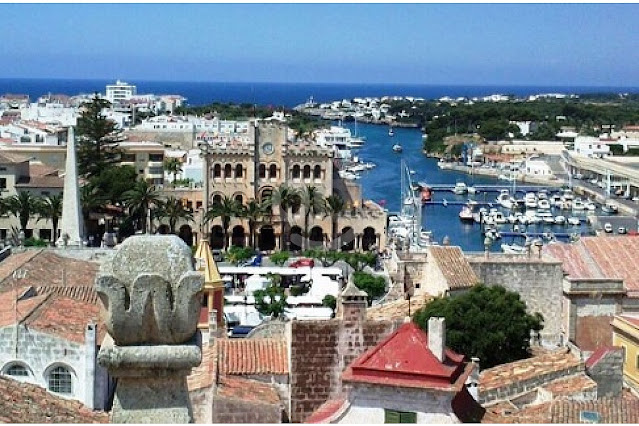
This view from roof of the cathedral, down to plaça de Born, showing governor's palace and the mouth of the inlet to the port
.jpg)
We decided to visit just one of the palaces open to the public and chose the Montes Saura Palacio as representative of the palaces built in 16th/17th century but refurbished in the 19th century with the fortunes made due to increased trade under the British rule. Not very interesting, very elaborate in that fusty, ornate Victorian style, for me, the storerooms, bodegas and patios had more charm than the formal rooms.

 This is the symbol of hospitality which is carved above the entrance to the palace, presumably meaning, no distinctions, all are welcome...........
This is the symbol of hospitality which is carved above the entrance to the palace, presumably meaning, no distinctions, all are welcome...........









Time for lunch! We had passed a place called Moriarty's on the way which had a bar and restaurant on ground floor of another palace, Salort, and a shady looking patio so we headed there, almost opposite the Saura palacio. Moriarty always reminds me of my great grandmother's maiden name rather than the arch enemy of Sherlock Holmes for whom the place was named, no doubt.



On our way back to the hotel for a siesta we came across a charming patio at the back of the Bishop's palace, Palau Episcopal.

Last night in Ciudatella, we decided to explore the port area further, I had seen an interesting old Vermuteria serving the popular Vermut made in Menorca, alas it was closed down, looked like permanently. All very pretty with light reflections in the water, fun to see the little boats returning to the port with their lights on and making difficult maneuvers into tight spaces. A last drink with some tapas and time to head back to our monastery.






Wednesday - October 4
After a very good lunch at a place in the harbour it was time to find our hotel for the next 3 nights so back along winding roads to Ferrerias, a village in the middle of the island, a good base for exploring. The hotel Hort San Patrici was orginally a farm but had been somewhat gentrified in the 19th century continuing as a family home and then a few years ago the family decided to open it as a small 8 room hotel. This involved totally gutting the interior to create airy minimalist reception rooms and comfortable bedrooms. The grounds are lush and green fed by a small stream, a wonderful pool which blended into the landscape perfectly.
I was so looking forward to visiting the Hauser and Wirth art museum on an island in the bay. Hauser and Wirth
The former British Naval hospital was built in the late 18th century on Isla del Rey. The hospital building has been preserved and the art foundation have taken over the huge storerooms and out houses, perfect for galleries, a shop and a restaurant which is run by one of the best know resturants and bodegas in Menorca, Bodegas Binifadet. The whole complex is surrounded by pretty gardens and groves of wild olive trees, fantastic views of Mahon across the bay and out to the sea.
The trip was fun, a specially designated ferry ride from the docks of Mahon, out towards the mouth of the bay, 15 minutes, an open ticket back before 16.00 so there was plenty of time to stroll around to see the exhibits and explore the old hospital.
These paintings seem spontaneous but are in fact meticulously planned, very much keeping in mind the sweep of the artists brush and defined by the length of her arm. Some are a little disturbing with very sexual content, lots of flesh and contortions but the faces are almost icon like in their poses, seemingly serene and not involved with what's going on with the bodies. These paintings are not easy on the eye, they are a challenge but worth studying and appreciating.

 This is the symbol of hospitality which is carved above the entrance to the palace, presumably meaning, no distinctions, all are welcome...........
This is the symbol of hospitality which is carved above the entrance to the palace, presumably meaning, no distinctions, all are welcome...........








Time for lunch! We had passed a place called Moriarty's on the way which had a bar and restaurant on ground floor of another palace, Salort, and a shady looking patio so we headed there, almost opposite the Saura palacio. Moriarty always reminds me of my great grandmother's maiden name rather than the arch enemy of Sherlock Holmes for whom the place was named, no doubt.



On our way back to the hotel for a siesta we came across a charming patio at the back of the Bishop's palace, Palau Episcopal.

Last night in Ciudatella, we decided to explore the port area further, I had seen an interesting old Vermuteria serving the popular Vermut made in Menorca, alas it was closed down, looked like permanently. All very pretty with light reflections in the water, fun to see the little boats returning to the port with their lights on and making difficult maneuvers into tight spaces. A last drink with some tapas and time to head back to our monastery.






Wednesday - October 4
Today it was time to pick up our hire car for explorations further afield, it meant a trip to the airport in Mahon which was easy by bus, just 40 minutes from one end of the island to the other. For the first time we were going through the countryside on either side of the one main road, incredibly green and fertile with lots of wooded areas, black and white cows grazing, the dairy industry is important to make all that Menorcan cheese and ice cream.
Great to hop into the car and feel free to plan some adventurous itineraries. On the way to our next hotel we took a detour to the North coast harbour of Fornell. A really beautiful trip along the East coast salt marsh area, the nature reserve of Parc Natural de s'Albufera des Grau, full of birds and luminescent light.
Fornells is a village with a lot of character and in a wonderful position on the long inlet leading from the salt marches to the open sea of the North coast, the rugged red cliffs and secluded beaches.
After a very good lunch at a place in the harbour it was time to find our hotel for the next 3 nights so back along winding roads to Ferrerias, a village in the middle of the island, a good base for exploring. The hotel Hort San Patrici was orginally a farm but had been somewhat gentrified in the 19th century continuing as a family home and then a few years ago the family decided to open it as a small 8 room hotel. This involved totally gutting the interior to create airy minimalist reception rooms and comfortable bedrooms. The grounds are lush and green fed by a small stream, a wonderful pool which blended into the landscape perfectly.
Hort San Patrici
One thing we really loved about the hotel was the sumptious breakfast, a great mix of cheese and yogurt made on the farm, charcuterie, cakes and breads, endless coffee, fresh fruit and cereals.
The actual Puerto de Sanija was almost non existent, just a dilapidated jetty leading from a ruined boat house and a few boats, very atmospheric though.
Today we deemed Talyotic culture day, time to explore a few of the better preserved Talyotic sites.
Unique treasures,the earliest 4000 years old, extending to Roman invasions in 100 BC, scattered all over the island, a large variety of megalithic settlements that reveal the way of life and the traditions of prehistoric island inhabitants; dwelling-houses, watchtowers or guard towers known as Talayots or the spectacular T stones, Taulas.
The era covers the Neolithic until the Early Bronze Age, with an economy based on livestock and incipient agriculture.
The first human inhabitants date back to the Bronze Age (roughly 1700 BCE), and the site reflects the different phases of prehistory on Minorca practically until the Christian reconquest by King Alfonso III of Aragón in 1287, when it was finally abandoned for good. Noteworthy are its three talayots (dating from 1000 to 800 BCE) at the top of the hill, and its taula sanctuary built of large stone slabs and dating back to the 4th century BCE. Excavations done inside uncovered a small bronze statue of the Egyptian demigod Imhotep, this object came to the island by trade with Carthage.
The village is especially noted for its complex and interesting set of dwellings from the post-talayotic period (550-123 BCE), which have been excavated successively by different groups of researchers and institutions.
The post-talayotic houses feature a circular layout around an uncovered central courtyard that opened onto different rooms for different uses (store rooms, rooms for leisure, workshops and kitchens). Also fascinating is their system for gathering and purifying water on the southern edge of town.
One thing we really loved about the hotel was the sumptious breakfast, a great mix of cheese and yogurt made on the farm, charcuterie, cakes and breads, endless coffee, fresh fruit and cereals.
Once we were checked in and explored our surroundings we went for dinner in Ferrerias which has a number of decent restaurants, we chose one called La Viajera, really good food, some quite exotic touches served in a leafy patio, we were too occupied with the food to take photos but I really liked these lamps in the entrance, quirky, minimal and imaginative.
Thursday, October 05
We had notices a sign for Cala Pergonda yesterday and checking on the map it looked like a good walk and not accessible to cars. It's about 30 minute drive from Ferrerias but no roads except detouring through the next village of Es Mercadel and then north to Platja de Binimel La, then hiking to Pergonda. Really impressive scenery with wild coast and red earth, loved the walk.
On the way back to base we wanted to visit Puerto de Sanija near the Cape Cavalleria lighthouse on a long ismus. We drove as far as Sanija and could not advance any further, yet another Italian film crew were shooting, around the lighthouse, the road was blocked, didn't matter, we had a great walk along the coast with some splendid scenery.
On the way back to base we wanted to visit Puerto de Sanija near the Cape Cavalleria lighthouse on a long ismus. We drove as far as Sanija and could not advance any further, yet another Italian film crew were shooting, around the lighthouse, the road was blocked, didn't matter, we had a great walk along the coast with some splendid scenery.
The actual Puerto de Sanija was almost non existent, just a dilapidated jetty leading from a ruined boat house and a few boats, very atmospheric though.
Time to head back to find another restaurant for dinner, what a slog!
Friday, October 06
Unique treasures,the earliest 4000 years old, extending to Roman invasions in 100 BC, scattered all over the island, a large variety of megalithic settlements that reveal the way of life and the traditions of prehistoric island inhabitants; dwelling-houses, watchtowers or guard towers known as Talayots or the spectacular T stones, Taulas.
The era covers the Neolithic until the Early Bronze Age, with an economy based on livestock and incipient agriculture.
We started with the necropolis at Cala Morell. A bit surprised to see that the coast there had been quite developed with villas clinging to the cliffs, it was very beautifully planned with each villa fitting into the natural landscape and really didn't interfere with exploration of the necropolis.The tombs were conceived for the living to worship the dead. Some of the funerary caves had a kind of atrium in front of the door where food was offered in ceramic containers.




After exploring the necropolis we hiked to the coast to see if we could access the Talayotic settlement built on top of a rocky outcrop above the sea. The trek was quite tough and not sure it was entirely worth seeing the few remains at the top, just walls, the view was amazing though!

 Going east along the coast, a beach which looked great on the map involving a walk through woods, Cala Algaiarens. There is a place to park the car about 1km away, the walk through the pine woods was lovely and beach fantastic, a bit surprised that quite a few other people had the same idea. We had a quick swim and needed to find lunch, would have been a good idea to bring a picnic.
Going east along the coast, a beach which looked great on the map involving a walk through woods, Cala Algaiarens. There is a place to park the car about 1km away, the walk through the pine woods was lovely and beach fantastic, a bit surprised that quite a few other people had the same idea. We had a quick swim and needed to find lunch, would have been a good idea to bring a picnic.









After exploring the necropolis we hiked to the coast to see if we could access the Talayotic settlement built on top of a rocky outcrop above the sea. The trek was quite tough and not sure it was entirely worth seeing the few remains at the top, just walls, the view was amazing though!

 Going east along the coast, a beach which looked great on the map involving a walk through woods, Cala Algaiarens. There is a place to park the car about 1km away, the walk through the pine woods was lovely and beach fantastic, a bit surprised that quite a few other people had the same idea. We had a quick swim and needed to find lunch, would have been a good idea to bring a picnic.
Going east along the coast, a beach which looked great on the map involving a walk through woods, Cala Algaiarens. There is a place to park the car about 1km away, the walk through the pine woods was lovely and beach fantastic, a bit surprised that quite a few other people had the same idea. We had a quick swim and needed to find lunch, would have been a good idea to bring a picnic.




Friday, October 07
Time to check out of Hort San Patrici and get on the road for our last two nights in Mahon. But not before a last visit to Ferrerias to buy some traditional hand made sandals, not the Menorquino style , Avarcas, which neither of us like but some simple strappy sandals in one of the many shops selling them, Ferrarias seems to have built up a tradition of leather work.
This was to be the last day with the car so we wanted to make the most of it before checking into Mahon.
More Talayotic adventures, We visited a site that took a lot of homework to discover and actually was the most magical of all the sites Torre Lafuda and then as contrast the most extensive Talyotic site at Torre d'en Galmés and also the beach at Cala en Porter before making our way into Mahon in the early evening.
Torre Lafuda
The talayotic village of Poblat Torre d'en Galmés is located near Alaior, taking up part of a promontory, it commands a sweeping view of the surrounding land and the southern coast , it represents nearly every phase of prehistory on Minorca until its Christian reconquest.The first human inhabitants date back to the Bronze Age (roughly 1700 BCE), and the site reflects the different phases of prehistory on Minorca practically until the Christian reconquest by King Alfonso III of Aragón in 1287, when it was finally abandoned for good. Noteworthy are its three talayots (dating from 1000 to 800 BCE) at the top of the hill, and its taula sanctuary built of large stone slabs and dating back to the 4th century BCE. Excavations done inside uncovered a small bronze statue of the Egyptian demigod Imhotep, this object came to the island by trade with Carthage.
The village is especially noted for its complex and interesting set of dwellings from the post-talayotic period (550-123 BCE), which have been excavated successively by different groups of researchers and institutions.
The post-talayotic houses feature a circular layout around an uncovered central courtyard that opened onto different rooms for different uses (store rooms, rooms for leisure, workshops and kitchens). Also fascinating is their system for gathering and purifying water on the southern edge of town.
It is impressive but we were surprised at how extremely primitive the building methods were, the stones are worked but minimally with no embellishment. And yet this was not a remote civilization cut off from other great Mediterranean powers in the middle east, Greece and later Rome. Mysterious.
Our last day on Menorca, tomorrow we have an early flight to Madrid, we will be there by 09.45.Cala En Porter
We were expecting this to be a busy touristy resort on the south coast but were pleasantly surprised to find a very special location with lovely white sand beach in a deep inlet at the bottom of a gorge with woods and plants coming right up to the beach. There were some low key bars and a couple of restaurants but it felt serene and I loved being able to wade out for 100 metres in glass clear turquoise water between the cliffs protecting the bay.
MAHON- MAO -We had left the booking in Mahon until the last minute and thank goodness we chose Es Castell which is a community further along the great bay of Mahon nearer the open sea. It was developed by the British in the 18th century mainly for military and naval purposes, many of the buildings have a neo-classic design from that period. Our hotel was in a great position, a short walk to the buzzing old fishing port and just steps away from the bus stop for getting into Mahon town in 10 minutes. From our window hat a view of bell towers and a windmill.
From the Plaça de S'Esplanada, the British parade ground, at the end of the hotel street one can walk directly to the old fishing port in 5 minutes, we had a good walk all along the mouth of the bay and ended up at the fishing port for dinner. Very lively, lots more louche bars and restaurants!
I was so looking forward to visiting the Hauser and Wirth art museum on an island in the bay. Hauser and Wirth
The former British Naval hospital was built in the late 18th century on Isla del Rey. The hospital building has been preserved and the art foundation have taken over the huge storerooms and out houses, perfect for galleries, a shop and a restaurant which is run by one of the best know resturants and bodegas in Menorca, Bodegas Binifadet. The whole complex is surrounded by pretty gardens and groves of wild olive trees, fantastic views of Mahon across the bay and out to the sea.
The trip was fun, a specially designated ferry ride from the docks of Mahon, out towards the mouth of the bay, 15 minutes, an open ticket back before 16.00 so there was plenty of time to stroll around to see the exhibits and explore the old hospital.
At the moment there are two exhibitions, the paintings of Christina Quarles , 'Come in from an endless place' and ‘After the Mediterranean’ an exhibition curated by Oriol Fontdevila, which brings together seven artists whose work addresses the social and ecological challenges affecting the region. Featuring Erola Arcalís, Adjoa Armah, Laia Estruch, artist collective Huniti Goldox, with Areej Huniti and Eliza Goldox, Omar Mismar, Sara Ouhaddou and Abi Shehu: including Spanish, Albanian, French Moroccan and Lebanese artists. They present existing and new works, the latter created through a residency program taking place in Menorca over the winter often in collaboration with local makers such as ceramicists and weavers.
These paintings seem spontaneous but are in fact meticulously planned, very much keeping in mind the sweep of the artists brush and defined by the length of her arm. Some are a little disturbing with very sexual content, lots of flesh and contortions but the faces are almost icon like in their poses, seemingly serene and not involved with what's going on with the bodies. These paintings are not easy on the eye, they are a challenge but worth studying and appreciating.
The other exhibition, ‘After the Mediterranean’ was also a challenge, some pieces very zen like and not conveying an easy message in their various forms of conceptual installation art. My favourites were the work of Sara Ouhaddou, , as I love calligraphy in art works I appreciated the subtle use of shapes in collage and repetitive mark making to hint at arab calligraphy on large scrolls of thick handmade paper, I was inspired.The meaning of these works was trying to convey the difficulty Europeans still have with the influences of medieval arabic culture on present day Europe.
After the galleries we walked around the island and had a snack at the restaurant before hopping on the 12.00 ferry back to the port.
Mahon
Sunday in Mahon was very quiet, most things closed but found a little place for lunch and then walked up and down the old streets. Some interesting architecture from15th century churches to art noveau houses and some great sculptures. A thriving town full of history because of its dominant position in the huge bay but it didn't have the same charm as Ciutadella. Back to bus station for short trip back to hotel.
Monday, October 09
Bye bye Menorca, we did a lot in just a week but the proportions of the island lend themselves to a short trip, many contrasts, some great food and good wine, outrageously expensive though! Back to good old Extremadura where wine rarely costs 6 euros a glass or 36 euros a bottle. We will miss the gorgeous seascapes and the super friendly people we met along the way.




